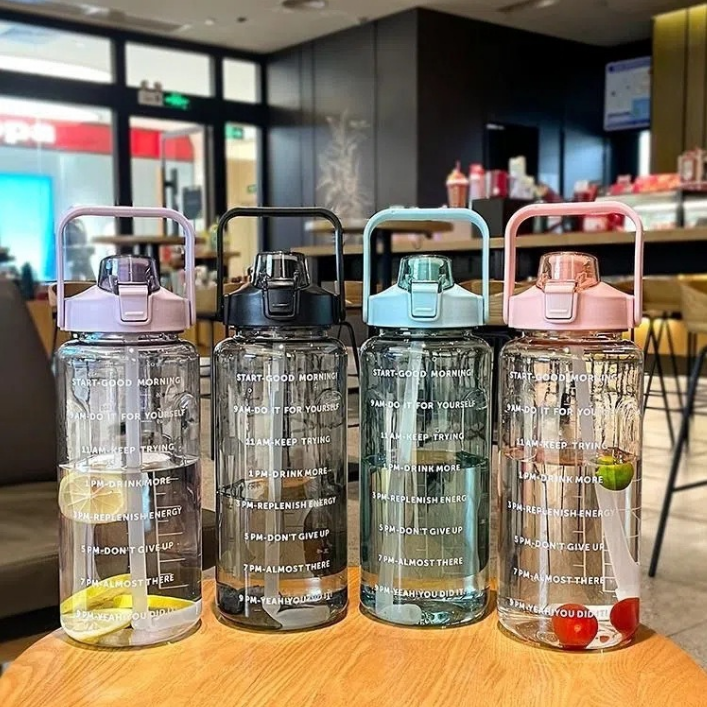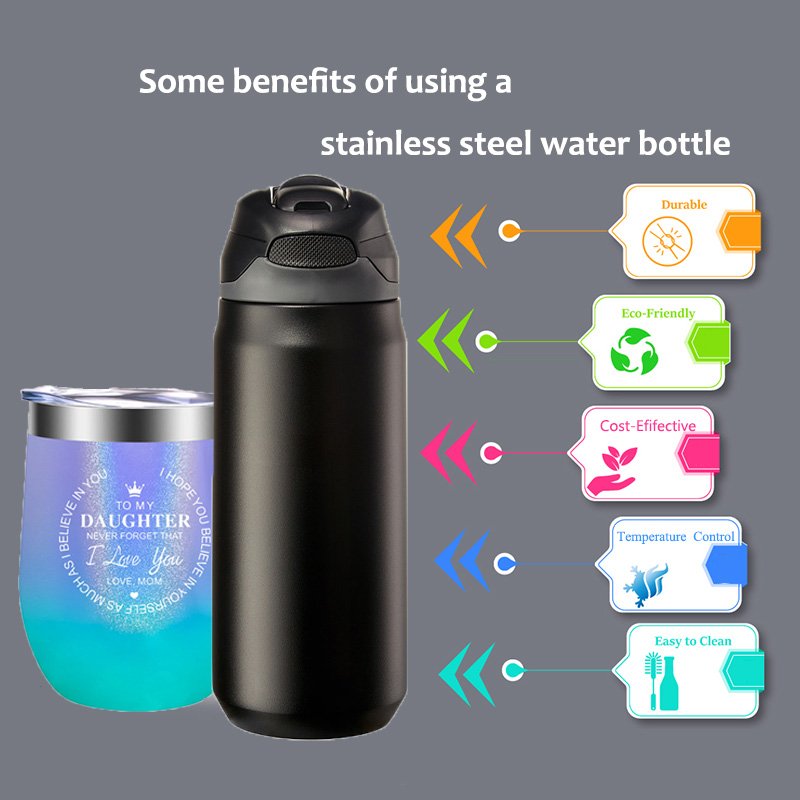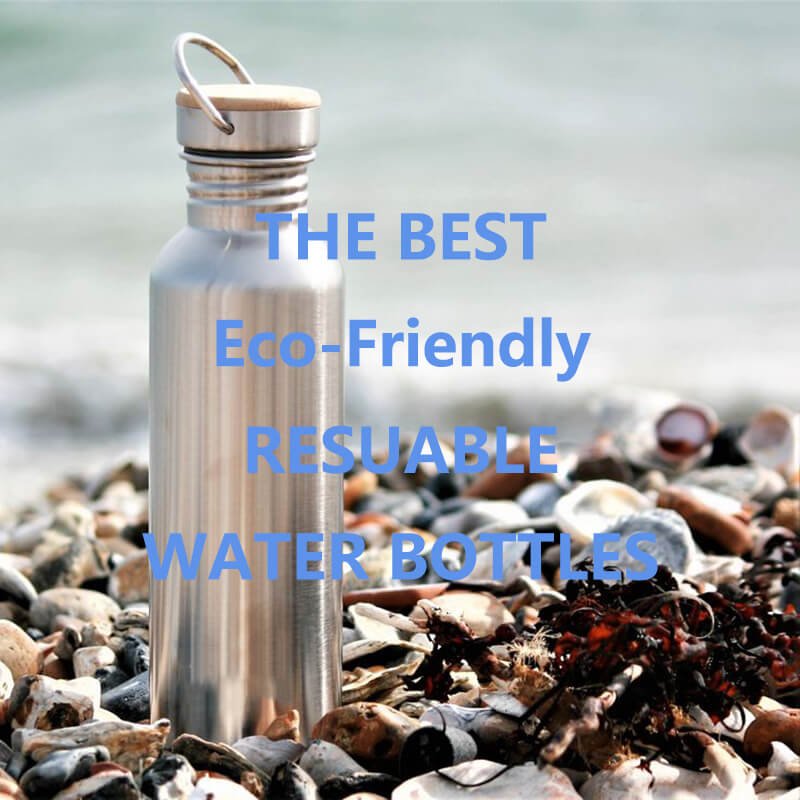Introduction to Large Water Bottles

Large water bottles have become a prevalent choice for many individuals looking to increase their daily water intake. Typically, a large water bottle is defined as having a capacity of 1 liter (34 ounces) or more. These bottles come in a variety of materials, each offering unique benefits. The most common materials include plastic, stainless steel, and glass.
Plastic bottles are often chosen for their lightweight nature and affordability. However, concerns about plastic’s environmental impact and potential health risks from chemical leaching have led some to seek alternative materials. Stainless steel bottles, on the other hand, are lauded for their durability and ability to maintain the temperature of their contents, whether hot or cold. Glass bottles, while heavier and more fragile, are praised for their purity and lack of chemical interaction with the stored liquid.
The popularity of large water bottles has surged across various demographics. Fitness enthusiasts and athletes appreciate the convenience of having a substantial amount of water readily available during workouts. Office workers and students find that these bottles help them meet their hydration goals throughout the day without frequent refills. Moreover, outdoor adventurers and travelers benefit from the capacity to carry enough water during long hikes or trips.
Several motivations drive the choice of a large water bottle. Health benefits are a significant factor, as staying properly hydrated is crucial for overall well-being, including maintaining energy levels, supporting cognitive function, and promoting healthy skin. Environmental concerns also play a role; by choosing reusable large water bottles, individuals can reduce their reliance on single-use plastic bottles, thereby contributing to environmental sustainability. Finally, convenience cannot be overlooked; having a large water bottle reduces the need for frequent refills, making it easier to stay hydrated throughout the day.
Health and Hydration Benefits
Staying properly hydrated is essential for overall well-being, and using large water bottles can significantly contribute to better hydration habits. One of the primary health advantages of using large water bottles is that they make it easier to track your water intake. When you have a larger capacity bottle, you are more likely to consume adequate amounts of water throughout the day without needing frequent refills. This convenience can encourage consistent hydration, which is vital for maintaining optimal health.
Proper hydration offers numerous health benefits. For instance, improved skin health is one of the most noticeable advantages. Adequate water intake helps to keep the skin hydrated, which can enhance its elasticity and appearance, leading to a clearer and more youthful complexion. Moreover, water plays a crucial role in digestion by aiding the process of breaking down food and absorbing nutrients. Staying well-hydrated can alleviate issues such as constipation and indigestion, promoting better digestive health.
Enhanced physical performance is another benefit of proper hydration. Water is essential for regulating body temperature and lubricating joints, which can improve endurance and reduce the risk of injuries during physical activities. Athletes and fitness enthusiasts often emphasize the importance of hydration for maintaining peak performance levels. Studies have shown that even mild dehydration can negatively impact physical performance, making it crucial to drink sufficient water, especially during exercise.
Expert opinions and scientific studies support these claims. For example, a study published in the Journal of Clinical Endocrinology & Metabolism found that drinking water can boost metabolic rate by up to 30% for about an hour. Additionally, the National Academies of Sciences, Engineering, and Medicine recommend a daily water intake of about 3.7 liters for men and 2.7 liters for women, emphasizing the importance of staying hydrated for overall health.
In conclusion, large water bottles are worth considering for their numerous health and hydration benefits. By making it easier to track and consume adequate water, they promote better skin health, improved digestion, and enhanced physical performance. Reliable studies and expert opinions further underscore the importance of staying properly hydrated for maintaining optimal health.

Environmental and Economic Impact
The use of large water bottles presents significant advantages in both environmental and economic spheres. One of the foremost environmental benefits is the reduction of plastic waste. Single-use plastic bottles contribute enormously to pollution, with millions ending up in landfills and oceans annually. By opting for a reusable large water bottle, individuals can significantly diminish their plastic footprint. For instance, using a 2-liter reusable water bottle can potentially replace over 1,400 single-use bottles per year, assuming an average consumption rate.
Furthermore, the economic implications of using large water bottles are equally compelling. Although the initial investment in a high-quality reusable bottle may seem higher, the long-term savings are substantial. Consider the scenario where a person purchases bottled water daily at an average cost of $1 per bottle. Over a year, this amounts to approximately $365. In contrast, a durable, reusable large water bottle may cost between $20 to $40. This one-time expense can eliminate the need for continual purchases, offering considerable savings over time.
Additionally, the production and transportation of single-use plastic bottles consume significant energy and resources. The manufacturing process involves the extraction of petroleum, which is not only costly but also environmentally detrimental. By shifting to large reusable water bottles, the demand for single-use bottles decreases, leading to reduced production and, consequently, lower carbon emissions.
Real-life examples further underscore these benefits. Many communities and organizations have successfully implemented programs encouraging the use of reusable water bottles. For instance, a university-wide initiative led to a 30% reduction in campus plastic waste within a year. Such initiatives highlight the broader impact that individual choices can have on environmental sustainability and economic efficiency.
Practical Considerations and Potential Drawbacks
When evaluating the practicality of large water bottles, several factors come into play. One of the primary considerations is portability. Large water bottles, while beneficial for reducing the frequency of refills, can be cumbersome to carry around. Their increased weight, especially when full, can pose a challenge for those on the move, such as commuters or hikers. For instance, carrying a 2-liter bottle on a long hike may not be feasible for everyone, as the added weight can lead to fatigue.
Another aspect to consider is the suitability of large water bottles for various activities. In an office setting, a large bottle can be quite convenient, reducing the need for frequent trips to the water cooler. In contrast, at the gym, a bulky bottle might take up unnecessary space and be less practical for quick sips between exercises. Outdoor enthusiasts might find larger bottles useful for extended trips, yet they must balance this with the need for lightweight gear.
Potential issues such as leakage and difficulty in cleaning are also noteworthy. Large water bottles with complex designs or multiple components are more prone to leaking if not properly sealed. Additionally, their size can make them harder to clean thoroughly, leading to potential hygiene concerns. User testimonials often highlight these drawbacks, with some users noting that residue can build up in hard-to-reach areas, requiring specialized brushes or cleaning solutions.
Despite these challenges, there are several ways to mitigate the downsides. Opting for bottles with ergonomic designs can enhance portability. Additionally, bottles with wide mouths or detachable parts can ease the cleaning process. Investing in high-quality, leak-proof bottles can also prevent spillage issues. Ultimately, understanding these practical considerations allows consumers to make informed choices about whether a large water bottle meets their specific needs.




Your blog has quickly become my go-to source for reliable information and thought-provoking commentary. I’m constantly recommending it to friends and colleagues. Keep up the excellent work!
أنابيب السيليكون التي يقدمها مصنع إيليت بايب مصممة لتوفير مقاومة عالية للحرارة ومرونة فائقة. هذه الأنابيب ضرورية للتطبيقات التي تتطلب التحمل للتغيرات الحرارية، وتتميز بمتانتها التي تجعلها مناسبة للعديد من العمليات الصناعية. التزامنا بالجودة يضمن أن أنابيب السيليكون الخاصة بنا هي من بين الأفضل في العراق. قم بزيارتنا على elitepipeiraq.com للحصول على المزيد من التفاصيل.
thc gummies legal oblige scout’s honour helped me rule over mundane stress and strain without making me sensation out of it. I explosion unified in the evening after undertaking, and within 30 minutes, I’m personality more relaxed. It’s like a minuscule mental reset. They savour like regular candy but take place with all the calming benefits of CBD. I was a morsel unsure at foremost, but now I stow away a quarrel in my nautical galley at all times. If you’re dealing with thirst, importance, or valid extremity to unwind, these are a gross lifesaver. Condign clear sure you’re getting them from a trusted trade name!
delta 9 drops purvey a discreet and enjoyable method for the sake experiencing the compound’s effects. Close by in a broad range of flavors, strengths, and blends, they agree to an eye to faithful dosing and transfer effects that incline to last longer. Many users addle to these gummies in search their calming and stress-reducing benefits. That said, it’s basic to exercise them responsibly, as the initiation of effects is typically slower than with methods like smoking or vaping. Every follow dosage recommendations and affirm that their avail is authorized in your area in the past consuming or purchasing.
заработок на аккаунтах https://birzha-akkauntov-online.ru/
маркетплейс аккаунтов соцсетей продажа аккаунтов соцсетей
купить аккаунт magazin-akkauntov-online.ru/
площадка для продажи аккаунтов https://ploshadka-prodazha-akkauntov.ru/
биржа аккаунтов биржа аккаунтов
площадка для продажи аккаунтов https://kupit-akkaunt-top.ru
услуги по продаже аккаунтов гарантия при продаже аккаунтов
Verified Accounts for Sale Social media account marketplace
Account Purchase Buy accounts
Database of Accounts for Sale Account Buying Platform
Guaranteed Accounts Account exchange
Marketplace for Ready-Made Accounts Buy accounts
Account marketplace Account Exchange Service
Secure Account Purchasing Platform Account Market
Website for Buying Accounts Guaranteed Accounts
Accounts for Sale Secure Account Purchasing Platform
Account Trading Platform Account trading platform
Account Selling Service Buy Account
buy account account catalog
account store find accounts for sale
sell account account catalog
profitable account sales secure account purchasing platform
account marketplace accountsmarketbest.com
secure account sales account trading service
buy accounts accounts marketplace
gaming account marketplace website for selling accounts
account trading platform account acquisition
accounts for sale database of accounts for sale
guaranteed accounts sell pre-made account
buy account account selling platform
account buying platform website for buying accounts
ready-made accounts for sale profitable account sales
verified accounts for sale verified accounts for sale
find accounts for sale accounts marketplace
accounts marketplace social media account marketplace
account store account marketplace
account store account marketplace
account market verified accounts for sale
account buying platform secure account sales
account marketplace accounts marketplace
profitable account sales account trading
account market buy account
account market social media account marketplace
social media account marketplace website for buying accounts
I’ve been using https://www.nothingbuthemp.net/collections/thc-gummies constantly seeing that during the course of a month at the moment, and I’m truly impressed at near the sure effects. They’ve helped me feel calmer, more balanced, and less tense everywhere the day. My snore is deeper, I wake up refreshed, and uniform my nave has improved. The attribute is famous, and I appreciate the accepted ingredients. I’ll categorically heed buying and recommending them to everybody I know!
purchase ready-made accounts account store
sell accounts sell accounts
account buying platform https://accounts-offer.org/
sell pre-made account https://accounts-marketplace.xyz
guaranteed accounts https://buy-best-accounts.org
buy accounts https://accounts-marketplace.live
ready-made accounts for sale https://social-accounts-marketplace.xyz
website for selling accounts https://buy-accounts.space
account exchange https://buy-accounts-shop.pro/
buy account https://accounts-marketplace.art/
find accounts for sale https://buy-accounts.live
account sale https://accounts-marketplace.online
account store https://accounts-marketplace-best.pro
продажа аккаунтов akkaunty-na-prodazhu.pro
магазин аккаунтов https://rynok-akkauntov.top/
маркетплейс аккаунтов kupit-akkaunt.xyz
магазин аккаунтов https://akkaunt-magazin.online
биржа аккаунтов https://akkaunty-market.live/
купить аккаунт магазины аккаунтов
биржа аккаунтов akkaunty-optom.live
продать аккаунт https://online-akkaunty-magazin.xyz/
маркетплейс аккаунтов https://akkaunty-dlya-prodazhi.pro/
маркетплейс аккаунтов https://kupit-akkaunt.online
buy facebook profiles buy fb ads account
facebook ad account for sale https://buy-ad-accounts.click/
buy fb ads account buy-ad-account.top
facebook ads accounts https://ad-account-buy.top/
buy facebook accounts for advertising cheap facebook account
buy facebook ad account buy fb ads account
buy facebook advertising https://buy-ad-account.click
Этот информативный текст выделяется своими захватывающими аспектами, которые делают сложные темы доступными и понятными. Мы стремимся предложить читателям глубину знаний вместе с разнообразием интересных фактов. Откройте новые горизонты и развивайте свои способности познавать мир!
Подробнее – https://medalkoblog.ru/
buy facebook ad account ad-accounts-for-sale.work
google ads account for sale buy verified google ads account
buy google ads accounts https://buy-ads-accounts.click/
buy old google ads account buy google adwords accounts
buy aged google ads account https://ads-account-buy.work
buy google ads threshold account https://buy-ads-invoice-account.top
google ads account seller buy-account-ads.work
buy old google ads account google ads account for sale
google ads account for sale google ads account buy
buy bm facebook https://buy-business-manager.org/
buy google ads threshold accounts buy google agency account
buy google ads threshold account https://buy-verified-ads-account.work
buy facebook business manager buy-bm-account.org
verified bm for sale buy-verified-business-manager-account.org
buy facebook business manager accounts https://buy-verified-business-manager.org/
unlimited bm facebook business-manager-for-sale.org
facebook verified business manager for sale https://buy-business-manager-verified.org/
buy fb business manager buy verified bm
buy verified bm facebook buy-business-manager-accounts.org
buy tiktok ad account tiktok ads account buy
buy tiktok business account https://tiktok-ads-account-buy.org
tiktok ad accounts buy tiktok ads account
tiktok agency account for sale https://tiktok-agency-account-for-sale.org
tiktok ads account buy https://buy-tiktok-ad-account.org
tiktok ad accounts https://buy-tiktok-ads-accounts.org
buy tiktok ad account buy tiktok business account
buy tiktok ads https://buy-tiktok-ads.org
buy tiktok ads accounts https://tiktok-ads-agency-account.org
buy facebook account find accounts for sale website for buying accounts
buy fb ads account account trading platform account trading service
Wenn Sie diese Schritte befolgen, können Benutzer sicher auf die Plattform zugreifen und sofort beginnen, alles zu genießen, was Princess Casino bietet.
Casino.guru sieht sich als eine unabhängige Informationsplattform über Online Casinos und Online Casinospiele, die von keinem Glücksspielanbieter oder irgendeiner anderen Instanz kontrolliert wird.
Je nach gewählter Methode erhalten Sie Ihr Geld
meist innerhalb von 1–3 Werktagen, bei E-Wallets sogar sofort.
Mehr als nur ein Spiel im Princess Casino erhalten Sie Boni und Belohnungen, die Ihr Spiel spannender machen. Das Casino bietet
außerdem regelmäßig Freispielaktionen für neue und treue Spieler an. Viele Slot-Spiele bieten Freispiele im Spiel,
expandierende Wilds und Multiplikatoren, die Ihre Gewinne in die Höhe treiben können. Es
gibt kein besseres Gefühl, als einen Freispielbonus zu ergattern. Egal, ob Sie beim Blackjack strategische Gewinne anstreben oder beim Roulette dem Spin nachjagen, das Live-Casino bietet immersive Action, die Sie in Standard-RNG-Spielen nicht finden. Das
Online-Casino Princess bietet eine komplette Suite von Live-Dealer-Spielen, bei denen professionelle Croupiers in Echtzeit Tische hosten.
Ich habe 100 % Bonus auf meine erste Einzahlung erhalten, und Freispiele waren ebenfalls
enthalten. Ja, Princess Casino bietet einen attraktiven Willkommensbonus für neue Spieler.
Princess Casino bietet eine breite Auswahl an Spielen, darunter Slots, Tischspiele, Live-Casino und Lotteriespiele.
Ich schätze besonders die Vielfalt an Slots und Tischspielen, die für Abwechslung sorgt.
Besonders beeindruckend finde ich die Kombination aus Freispielen und Bonusgeld bei jeder
Einzahlung.
References:
https://online-spielhallen.de/vegas-casino-bonuscode-ihr-schlussel-zu-aufregenden-belohnungen/
The states and the tribal casinos agreed to an 18% tax on internet gaming, and both sites were
offering real-money casino games by early 2023. Then we threw out any that weren’t licensed online casinos in the US by their respective
states’ gaming control agencies to ensure we were only
dealing with legitimate and safe real money online casino
sites. We looked at bonuses, the online casino
sites’ reliability and graphics, casino games and slot selections, and ease of deposits and withdrawals.
These casinos provide a wide variety of games, from classic pokies
to the latest video pokies with impressive graphics and features.
We researched lots of online casinos in order to find the very best options
for you and we vouch for the safety and security of each one.
Different players have different tastes and preferences, but it seems like the most popular casino games
in Poland are table games with blackjack and roulette
taking the lead. Thank you for reading our
review of the best Polish online casinos! We hope that online casinos founded and based
in Poland would be allowed to open in the future.
Private Polish online casinos were prohibited and Polish gamblers were not allowed to bet at legal European online
casinos either.
Lucky Creek welcomes you with a 200% match bonus up to $7,500
and 200 free spins. Ducky Luck Casino welcomes you with a powerful 500% bonus up
to $2,500 and 150 free spins. Start at Cafe Casino with a welcome offer of
up to $2,000 and 150 Free Spins. The legal age to start playing is 19 for most cases, but 18+ is an exception for Alberta,
Manitoba, and Quebec. The local gambling
activity is regulated by the Criminal Code of Canada,
and dedicated local authorities set more specific rules for each province.
You’ll often experience a C$10 minimum limit and a fast processing time of 0 to 24
hours for e-wallets and blockchain methods, and our comparison table will
highlight more information.
References:
https://blackcoin.co/netbet-casino-erfahrungen/
online casinos that accept paypal
References:
https://behired.eu/employer/online-casino-mit-paypal-einzahlung-die-top-casinos-im-vergleich/